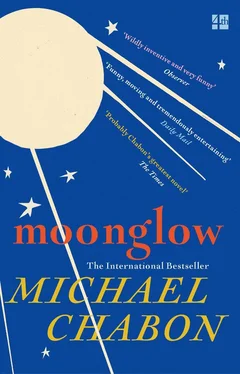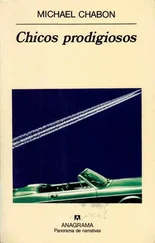My grandfather looped the cord of the handset around the president’s throat. He had maybe two minutes before the rocket of his anger burned up its fuel and fell back to earth. That would be ample time. During World War II, he had been trained in the use of a garrote.* He knew that, done properly, strangulation was short work.
“Oh my God,” said the secretary, Miss Mangel, making a late appearance on the scene.
She had reacted quickly when my grandfather burst into her office smelling, she would recall afterward, like wood smoke. She had managed to buzz twice before my grandfather grabbed the handset away from her. He picked up the intercom. He yanked the handset cord from the base.
“You’ll have to pay for that,” Miss Mangel said.
When he told this story thirty-two years later, my grandfather put a checkmark of admiration beside Miss Mangel’s name, but with his rocket only halfway up the slope of its parabola he took her words as provocation. He threw the base of the intercom out the window of Miss Mangel’s office. The chiming noted by the president was the sound of the intercom sailing through a spiderweb of glass into the street.
Hearing a cry of outrage from below, Miss Mangel went to the window to look. Down on the sidewalk a man in a gray suit was sitting looking up at her. There was blood on the left lens of his round spectacles. He was laughing.* People stopped to help him. The doorman announced that he was going to call the police. That was when Miss Mangel heard her boss screaming. She turned from the window to run into his office.
At first glance the office appeared to be empty. Then she heard the tap of a shoe against a linoleum floor, a tap, another tap. The back of my grandfather’s head rose from behind the desk, then sank again. Brave Miss Mangel went around the desk. Her boss lay sprawled on his belly on the polished floor. My grandfather straddled his back, hunched forward, applying the impromptu garrote. The president bucked, and thrashed, and tried to roll himself over. The only sound was the toes of his cordovan bucks trying to get purchase against the linoleum.
Miss Mangel snatched up a letter opener from the president’s desk and jabbed it into my grandfather’s left shoulder. In my grandfather’s reckoning, many years later, this action merited another checkmark.
The point of the letter opener sank only half an inch or so into meat, but the bite of metal blocked some meridian in the flow of my grandfather’s rage. He grunted. “It was like I woke up,” he said when he told me this part of the story for the first time, during the last week of his life. He unwound the cord from the president’s neck. He peeled it from the grooves it had cut into the flesh of his own left hand. The handset clattered against the floor. With a foot on either side of the president, he stood up and took a step away. The president flopped onto his back and raised himself into a sitting position, then sledded backward on his ass into a notch between two filing cabinets. He sobbed for air. When his face had hit the floor, he’d bitten his lower lip, and now his teeth were dyed pink.
My grandfather turned to face Miss Mangel. He plucked out the letter opener and laid it on the president’s desk. When one of his rages wore off, you could see regret flooding his eyes like seawater. He dropped his hands to his sides.
“Forgive me,” he said to Miss Mangel and to the president. I suppose he was also saying it to my mother, fourteen at the time, and to my grandmother, though arguably she was as much to blame as my grandfather. There was scant hope of forgiveness, but my grandfather did not sound as if he expected, or even wanted, to find any.
* * *
At the end of my grandfather’s life, his doctor prescribed a powerful hydromorphone against the pain of bone cancer. A lot of Germans were busy knocking holes in the Berlin Wall around that time, and I showed up to say goodbye to my grandfather just as Dilaudid was bringing its soft hammer to bear on his habit of silence: Out flowed a record of his misadventures, his ambiguous luck, his feats and failures of timing and nerve. He had been installed in my mother’s guest bedroom for almost two weeks, and by the time I arrived in Oakland he was getting nearly twenty milligrams a day. He started talking almost the minute I sat down in the chair by his bed. It was as if he had been waiting for my company, but I believe now that he simply knew he was running out of time.
The recollections emerged in no discernible order apart from the first, which was also the earliest.
“Did I tell you,” he said, lolling on his palliative cloud, “about the time I dropped a kitten out of the window?”
I did not say, then or at any point until he sank into the cloud for good, that he had told me very little about his life. I had yet to hear about the attack on the president of Feathercombs, Inc., so I could not point out to him that I sensed a motif of defenestration beginning to emerge in his autobiography. Later, when he did tell me about Miss Mangel, the intercom, and the Czech diplomat, I would choose to skip the smart remark.
“Did it die?” I asked him.
I was eating a cup of his raspberry Jell-O. Nothing else tempted his palate apart from a spoonful or two of the chicken soup my mother cooked for him, following the recipe of my late grandmother—born and raised in France—which called for a squeeze of lemon to brighten the broth. Even the Jell-O was not of much interest to him. There was plenty to spare.
“It was a third-story window,” my grandfather said. He added, as if his native city were known for its adamantine sidewalks, “in Philadelphia .”
“How old were you?”
“Three or four.”
“Jesus. Why would you do something like that?”
He poked out his tongue, once, twice. That was something he did every few minutes. It often looked as if he were passing clownish judgment on something you had told him, but it was really only a side effect of the meds. His tongue was pale and had the nap of suede. I knew from a few precious demonstrations during my childhood that he could touch the tip of it to the tip of his nose. Outside the window of my mother’s guest bedroom, the East Bay sky was gray as the nimbus of hair around his suntanned face.
“Curiosity,” my grandfather decided, and stuck out his tongue.
I said that I had heard curiosity could be harmful, in particular to cats.
As a boy, my grandfather lived with his parents, his father’s father, and his kid brother, Reynard—my mother’s Uncle Ray—in three rooms at the corner of Tenth and Shunk in South Philadelphia.
His father, a German-speaking native of Pressburg (now Bratislava), had failed in a series of dry goods stores and corner groceries throughout the 1920s and ’30s. After that he abandoned hope of enduring ownership and played out the string as a sales clerk in liquor stores, watching other men’s cash registers get robbed. In my grandfather’s recollections his mother appeared as a strong back and a heart of gold, a “saint” indentured to the service of her husband and sons. In photographs she is a boxy woman, girdled with steel, shod in coal-black stompers, her bosom so large it might have housed turbines. She was all but illiterate in Yiddish and English but obliged my grandfather, and later Uncle Ray, to read to her daily from the Yiddish press so that she could keep abreast of the latest calamities to beset Jewry. From every week’s household budget she managed to siphon off a dollar or two for the pushke can. Orphans of pogrom were fed, refugees berthed on steamships to freedom. Entire hillsides in Palestine bore the oranges of her compassionate embezzlement. “In the winter the laundry froze stiff on the clothesline,” my grandfather recalled. “She had to carry it up all those stairs.” Uncle Ray I knew as a playboy of the late 1960s in a sky-blue turtleneck and a gray tweed blazer. He drove an Alfa Spider and wore a raffish eyepatch over his gnarly left eye. Sometimes when I looked at him I thought of Hugh Hefner and sometimes of Moshe Dayan. As a boy, however, Reynard was studious and frail. It was my grandfather, in the early days, who ran wild. Throwing a kitten out of a window was only a warning shot.
Читать дальше












